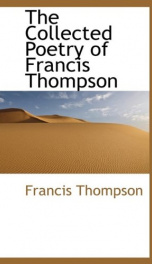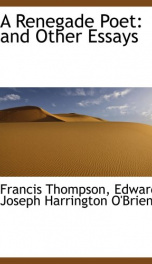Thompson Francis

Francis Thompson (16 December 1859 – 13 November 1907) was an English poet and ascetic. After attending college, he moved to London to become a writer, but in menial work, became addicted to opium, and was a street vagrant for years. A married couple read his poetry and rescued him, publishing his first book, Poems in 1893. Francis Thompson lived as an unbalanced invalid in Wales and at Storrington, but wrote three books of poetry, with other works and essays, before dying of tuberculosis in 1907. Born in Preston, Lancashire, his father was a doctor who had converted to Roman Catholicism, following his brother Edward Healy Thompson, a friend of Cardinal Manning. Thompson was educated at Ushaw College, near Durham, and then studied medicine at Owens College in Manchester. He took no real interest in his studies and never practised as a doctor, moving instead to London to try and become a writer. Here he was reduced to selling matches and newspapers for a living. During this time, he became addicted to opium, which he first had taken as a remedy for ill health. Thompson came to London in 1885 and lived a life of destitution until in 1888 he was 'discovered' after he sent poetry to the magazine Merrie England. He was sought out by the editors of 'Merrie England', Wilfrid and Alice Meynell and rescued from the verge of starvation and self-destruction. Recognizing the value of his work, the couple gave him a home and arranged for publication of his first book, Poems in 1893. The book attracted the attention of sympathetic critics in the St James's Gazette and other newspapers, and Coventry Patmore wrote a eulogistic notice in the Fortnightly Review of January 1894. Subsequently Thompson lived as an invalid in Wales and at Storrington. A lifetime of extreme poverty, ill-health, and an addiction to opium took a heavy toll on Thompson, even though he found success in his last years. Thompson attempted suicide in his nadir of despair, but was saved from completing the action through a vision which he believed to be that of a youthful poet, Chatterton, who had committed suicide almost a century earlier. Shortly afterwards, a prostitute - whose identity Thompson never revealed - befriended him, gave him lodgings and shared her income with him. Thompson was later to describe her in his poetry as his saviour. She soon disappeared, however, never to return. He would eventually die from tuberculosis, at the age of 48. His most famous poem, The Hound of Heaven [1] describes the pursuit of the human soul by God. This poem is the source of the phrase, "with all deliberate speed," used by the Supreme Court in Brown II, the remedy phase of the famous decision on school desegregation.[2] A phrase in his The Kingdom of God [3] is the source of the title of Han Suyin's novel and the movie Love is a Many-Splendored Thing. In addition, Thompson wrote the most famous cricket poem, the nostalgic At Lord's. He also wrote Sister Songs (1895), New Poems (1897), and a posthumously published essay, "Shelley" (1909). He wrote a treatise On Health and Holiness, dealing with the ascetic life, which was published in 1905. Francis Thompson's grave is in St.Mary's Roman Catholic Cemetery in London. Among Thompson's devotees was the young J.R.R. Tolkien, who purchased a volume of Thompson's works in 1913-1914, and later said that it was an important influence on his own writing.[4] The American novelist Madeline L'Engle used a line from the poem "The Mistress of Vision" as the title of her last Vicki Austin novel, Troubling a Star.
do you like this author?
What readers are saying
What do you think? Write your own comment on this book!
write a commentWhat readers are saying
What do you think? Write your own comment on this author!
write a commentBook list
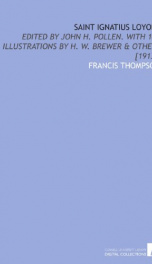
saint ignatius loyola
Series:
Unknown
Year:
Unknown
Raiting:
3.5/5
Originally published in 1913. This volume from the Cornell University Library's print collections was scanned on an APT BookScan and converted to JPG 2000 format by Kirtas Technologies. All titles scanned cover to cover and pages may include marks notations and other marginalia present in the original volume.
Show more
add to favoritesadd In favorites
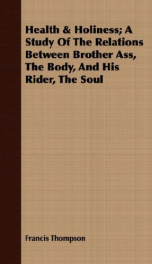
health holiness a study of the relations between brother ass the body and
Series:
Unknown
Year:
Unknown
Raiting:
4/5
Many of the earliest books, particularly those dating back to the 1900s and before, are now extremely scarce and increasingly expensive. We are republishing these classic works in affordable, high quality, modern editions, using the original text and artwork.
Show more
add to favoritesadd In favorites
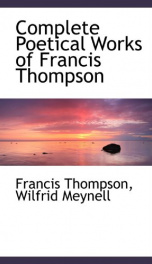
complete poetical works of francis thompson
Series:
Unknown
Year:
Unknown
Raiting:
5/5
COMPLETE POETICAL WORKS OF FRANCIS THOMPSON. - A NOTE BY FRANCIS THOMPSONS LITERARY EXECUTOR IN making this Collection I have been governed by Francis Thompsons express instructions, or guided by a knowledge of his feelings and preferences acquired during an unbroken intimacy of nineteen years. His own list of new inclusions and his own suggested reconsiderations of his formerly published text have been followed in this edition of his Poetical Works. May 1913. W. M. DEDICATION CONTENTS POEMS ON CHILDREN DAISY i THE POPPY 3 To MONICA THOUGHT DYING . . 6 THE MAKING OF VIOLA 9 ToMY GODCHILD 12 To OLIVIA 15 LITTLE JESUS 15 SISTER SONGS 18 LOVE IN DIANS LAP PROEMION 59 BEFORE HER PORTRAIT IN YOUTH.... 64 To A POET BREAKING SILENCE .... 66 MANUS ANIMAM PINXIT 68 A CARRIER SONG 71 SCALA JACOBI PORTAQUE EBURNEA.... 74 GILDED GOLD 75 HER PORTRAIT 77 EPILOGUE TO THE POETS SITTER . . . .82 DOMUS TUA 84 IN HER PATHS 84 AFTER HER GOING 85 BENEATH A PHOTOGRAPH . . . . .86 THE HOUND OF HEAVEN ..... 88 ODE TO THE SETTING SUN 94 CONTENTS AFTER-STRAIN To THE DEAD CARDINAL OF WESTMINSTER . , . 105 A CORYMBUS FOR AUTUMN Ill ECCLESIASTICAL BALLADS THE VETERAN OF HEAVEN n LILIUM REGIS 118 TRANSLATIONS A SUNSET . . . . 120 HEARD ON THE MOUNTAIN 122 AN ECHO OF VICTOR HUGO . . . .126 MISCELLANEOUS POEMS DREAM-TRYST 128 BUONA NOTTE 130 THE PASSION OF MARY 131 LENVOY 132 MESSAGES 132 AT LORDS 133 LOVE AND THE CHILD 134 DAPHNE 134 ABSENCE 136 A FALLEN YEW 138 A JUDGMENT IN HEAVEN 141 THE SERE OF THE LEAF 147 To STARS 152 LINES FOR A DRAWING OF OUR LADY OF THE NIGHT 1 54 ORISON-TRYST 155 WHERETO ART THOU COME . . . .156 SONG OF THE HOURS 157 PASTORAL 164 CONTENTS PAST THINKING OF SOLOMON . . . .166 A DEAD ASTRONOMER 167 CHEATED ELSIE 167 THE FAIR INCONSTANT 170 THREATENED TEARS 171 THE HOUSE OF SORROWS 172 INSENTIENCE 174 ENVOY 175 DEDICATION OF NEW POEMS 176 SIGHT AND INSIGHT THE MISTRESS OF VISION 177 CONTEMPLATION 186 BY REASON OF THY LAW . . . . .189 THE DREAD OF HEIGHT 190 ORIENT ODE 194 NEW YEARS CHIMES 201 FROM THE NIGHT OF FOREBEING . . . .203 ANY SAINT 215 ASSUMPTA MARIA 222 CARMEN GENESIS 226 AD CASTITATEM 230 THE AFTER WOMAN 233 GRACE OF THE WAY 236 RETROSPECT . 238 A NARROW VESSEL A GIRLS SIN 240 LOVE DECLARED 246 THE WAY OF A MAID 247 BEGINNING OF END 248 --This text refers to an alternate Paperback edition.
Show more
add to favoritesadd In favorites

Sister Songs; an offering to two sisters
Series:
Unknown
Year:
Unknown
Raiting:
4/5
Originally published in 1895. This volume from the Cornell University Library's print collections was scanned on an APT BookScan and converted to JPG 2000 format by Kirtas Technologies. All titles scanned cover to cover and pages may include marks notations and other marginalia present in the original volume.
Show more
add to favoritesadd In favorites

Shelley; an essay
Series:
Unknown
Year:
Unknown
Raiting:
4/5
Francis (Joseph) Thompson (1859-1907) was an English poet and ascetic. He studied medicine at Owens College in Manchester but took no real interest in his studies and never practised as a doctor, moving instead to London to try and become a writer. Here he was reduced to selling matches and newspapers for a living. During this time, he became addicted to opium, which he first had taken as a remedy for ill health. He came to London in 1885 and lived a life of destitution until in 1888 he was 'discovered' after he sent poetry to the magazine Merrie England. He was sought out by its editors, Wilfrid and Alice Meynell and rescued from the verge of starvation and self-destruction. Recognizing the value of his work, the couple gave him a home and arranged for publication of his first book, Poems in 1893. His most famous poem, The Hound of Heaven (1907) describes the pursuit of the human soul by God. In addition, Thompson wrote the most famous cricket poem, the nostalgic At Lord's. Other works include: Sister Songs (1895), New Poems (1897), On Health and Holiness (1905) and Shelley: An Essay (1909).
Show more
add to favoritesadd In favorites
What readers are saying
What do you think? Write your own comment on this author!
write a commentGenre
- Nonfiction / Politics / General
- Literature & Fiction / Poetry / General
- Law
- Biographies & Memoirs / Arts & Literature / Authors
- Reference / Encyclopedias / Art
- Nonfiction / Education / Education Theory / History
- Books / New Zealand poetry
- Religion & Spirituality / New Age
- Literature & Fiction / Authors, A-Z / ( P ) / Poe, Edgar Allan
if you like Thompson Francis try:
readers also enjoyed
What readers are saying
What do you think? Write your own comment on this author!
write a commentGenre
- Nonfiction / Politics / General
- Literature & Fiction / Poetry / General
- Law
- Biographies & Memoirs / Arts & Literature / Authors
- Reference / Encyclopedias / Art
- Nonfiction / Education / Education Theory / History
- Books / New Zealand poetry
- Religion & Spirituality / New Age
- Literature & Fiction / Authors, A-Z / ( P ) / Poe, Edgar Allan
if you like Thompson Francis try:
readers also enjoyed
Do you want to read a book that interests you? It’s EASY!
Create an account and send a request for reading to other users on the Webpage of the book!
